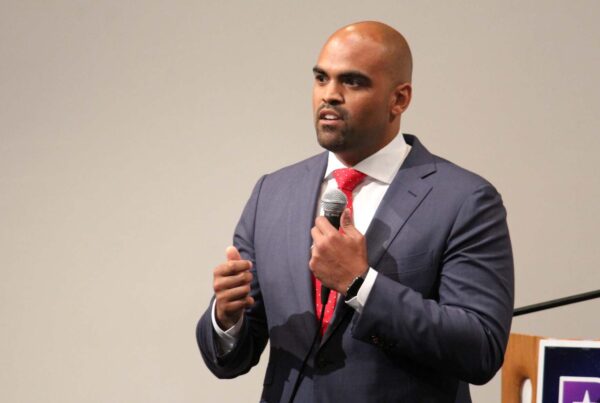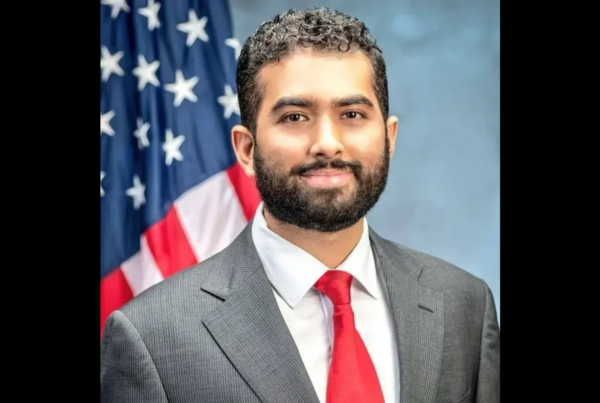Tomorrow night’s debate in Philadelphia is expected to be a critical moment in the presidential race.
The latest polls show a tight race in battleground states in the fight for the so-called “undecideds.” Traditionally, third-party endorsements have played a role in giving one side or the other an advantage.
An unexpected presidential endorsement at The Texas Tribune Festival in Austin created quite a buzz over the weekend. Former Republican Congresswoman Liz Cheney was asked who she and her famous father would be endorsing.
Daron Shaw, Frank C. Erwin Jr. chair of state politics at the University of Texas at Austin, joined Texas Standard to discuss. Listen to the interview above or read the transcript below.
This transcript has been edited lightly for clarity:
Texas Standard: Not so much a surprise that former Congresswoman Cheney would be voting for Vice President Harris this fall. But, when she was asked about her father, that elicited some noise in the room. How much of a surprise is it that former Vice President Dick Cheney, often characterized by his critics as a hard right Republican neocon, would be supporting Harris, too?
Daron Shaw: Well, I guess it’s a sign of how politics have changed, isn’t it?
I think Cheney is of a generation where you keep your reservations somewhat internal. You speak with your silence. And that’s something that you certainly see with former President George W. Bush and some other members of his administration.
You get the sense that they aren’t really crazy about Donald Trump. They probably have fairly serious problems with him and his role in the party. Maybe even more problems with his performance as president and the aftermath of his presidency on Jan. 6. But, they never really went public.
In that sense, this is a bit of a surprise. And, to the larger point, I think the concern among the Trump crowd is that there are non-MAGA, Nikki Haley-type Republicans. And the question is whether these endorsements are a signal that it’s okay to flirt with the other side or even cast a vote for the other side.
Yeah, just to be clear, former President George W. Bush is making a lot of headlines this morning saying that neither he nor former First Lady Laura Bush would be endorsing a candidate during this cycle. Earlier, a lot was made of former Hawaii Democratic Congresswoman Tulsi Gabbard and independent presidential candidate Robert F. Kennedy endorsing Trump. How common is it to see these sort of high profile endorsements from across the political aisle?
It’s very uncommon, actually, especially in this era of hyper-polarized politics.
But, the thing that’s interesting is that there’s been somewhat of a realignment. Since 2016, maybe even a little earlier, you see Hispanics, a group that’s been hardcore Democratic for years and years, becoming more of a swing group. You see lower status white voters, less-educated white voters moving from independents or Democrat-leaning to the Republican side. College-educated white voters have tended to move towards the Democrats.
So a realignment that we thought had kind of stalled out. It began in the 1960s over issues like race and social order. Conservative Democrats became Republican and a lot of white liberals moved away from the Republican Party towards the Democrats. We thought that had run its course by the early 2000s.
But now you’re seeing a “second order” of realignment. I think that is what we’re picking up on right now. And as the candidates have tried to exploit that – the Republicans move one way, the Democrats move the other – and some of these older political figures are left without a home.
» RELATED: New poll shows Trump leads Harris in Texas, but enthusiasm among Democrats is on the rise
When we hear about endorsements, there’s been a big question mark over whether or not these endorsements actually make a difference. But if we’re in this second order political realignment, as you’re describing it, what do you think these endorsements might mean? Do they give people permission to move one direction or another?
Yeah, it’s a good question. So the political science literature is pretty firm that endorsements seem to be potentially powerful, at least in primary elections, because you don’t have a party to anchor your vote choice. So someone like a Bernie Sanders or an AOC or Joe Biden, those sorts of endorsements are powerful signals to people.
In the general election, the sense that they don’t matter much is bound up in the fact that we already have our partisanship, so we don’t really need that extra information. But in this new era, maybe they are more consequential.
My knee-jerk reaction would be these are people from another era who aren’t really adding information that’s going to be influential. But, you do have a segment of non-MAGA Republicans for whom this might be consequential. Or on the other side, there might be more conservative Democrats, for whom Tulsi Gabbard and others might be influential. And we’re only talking about a point or two that’s necessary to flip an election now.
















